CIA Sponsored Terror, Climate Change, Guantanamo, Habeas Corpus, Human Rights, Political Prisoner, Prison Industry, War Resister
Podcast: Play in new window | Download
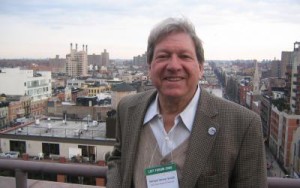
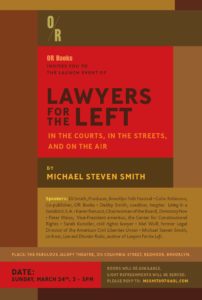
Lawyers For The Left: In The Courts, In the Streets And On The Air
Lawyers For The Left: In The Courts, In the Streets And On The Air is the title of the just published book by our own Michael Steven Smith. It profiles the some of the nation’s most effective agents of social change. Michael discusses how he came to write this book and previews several of the lawyers profiled therein.
As Chris Hedges quotes “The lawyers in this book valiantly fought the erosion of justice and assault on the court system.”
Portside Review by Bill Ayers:
Now open Michael Steven Smith’s smart and compelling Lawyers for the Left, and you’ll find yourself plunged into the contradictions and swirling through the vortex where that question—what is the law?—is on everyone’s mind all the time. It takes on a unique urgency and a fresh vitality as it’s debated case by case and issue by issue by these committed advocates battling against a system they see as deeply and unfairly stacked against their clients—Black freedom fighters, Puerto Rican independistas, Indigenous and immigrant rights activists, women warriors, anti-war militants, water defenders, dissidents and radicals. None of the lawyers you’ll meet here holds fast to the traditional view that the law is simply a civilized mechanism for resolving disputes in an intelligent and reasoned way. They agree, rather, that any honest analysis of the law begins elsewhere, noting that in all times and in all places, the law is constructed in the service of whatever social/economic system created it. In other words, the law is a mechanism of control that works to protect and perpetuate existing social relations.
—-

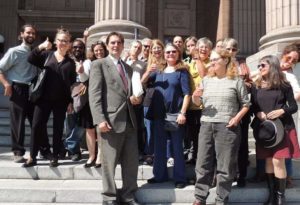
Necessity Defense Upheld In Climate Change Case
In a rare and heartening victory for climate change activists, a Washington state appeals court recently overturned the conviction of a man who employed the so-called necessity defense.
Activist Ken Ward said he had no alternative but to break into a pipeline facility to save the planet from global warming. While several lawyers and clients have presented this strategy in court, it is rarely allowed to proceed.
That’s because in most courts, including federal appeals courts, protesters are unable to meet the threshold burden of showing their actions were in reaction to an imminent threat, like fire chief Steve McQueen blowing up a skyscraper’s water tank to put out a fire in the film The Towering Inferno.
But in his April 8 decision, Judge David Mann ruled that Ward, quote, “reasonably believed the crimes he committed were necessary to minimize the harms that he perceived.”
Last year, Law and Disorder reported on how a Boston prosecutor reduced charges against 13 pipeline protesters who planned to mount a necessity defense, eliminating the possibility of a trial. Even so, West Roxbury Judge Mary Ann Driscoll still found them not guilty for reason of necessity.
In the Washington case, the Court of Appeals reversed the burglary conviction of Ken Ward, saying the trial court judge had violated his Sixth Amendment rights by refusing to allow him to present a “necessity defense” to the jury.
Guest – Ted Hamilton, co-founder and staff attorney of the Climate Defense Center. Ted has studied comparative literature and philosophy at Cornell and Yale, and written about books, politics, and climate change for a variety of publications. During law school he focused on protest defense and growing the climate movement through involvement in the Harvard divestment campaign and internships with the Civil Liberties Defense Center and Climate Disobedience Center.
Civil Liberties, Criminalizing Dissent, Human Rights, Human Trafficking, Political Prisoner, War Resister
Podcast: Play in new window | Download
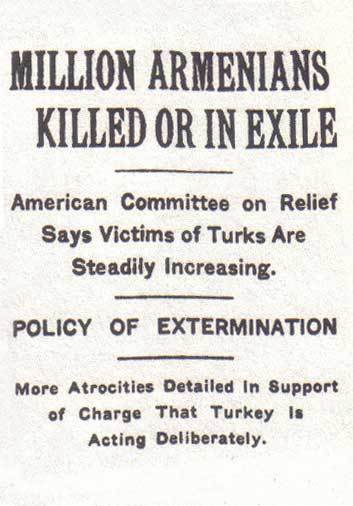
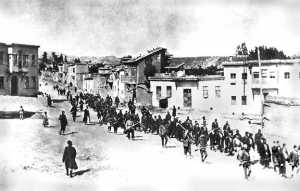
Speaking In Turkish: Denying the Armenian Genocide
Around the world, April 24 marks the observance of the Armenian Genocide. On that day in 1915 the Interior Minister of the Ottoman Empire ordered the arrest and hangings of Armenian intellectuals and community leaders in Constantinople. It was the beginning of a systematic and well-documented plan to eliminate the Armenians, who were Christian, and who had been under Ottoman rule and treated as second class citizens since the 15th century.
The unspeakable and gruesome nature of the killings—beheadings of groups of babies, dismemberments, mass burnings, mass drownings, use of toxic gas, lethal injections of morphine or injections with the blood of typhoid fever patients—render oral histories particularly difficult for survivors of the victims.
Why did this happen? Despite being deemed inferior to Turkish Muslims, the Armenian community had attained a prestigious position in the Ottoman Empire and the central authorities there grew apprehensive of their power and longing for a homeland. The concerted plan of deportation and extermination was effected, in large part, because World War I demanded the involvement and concern of potential allied countries. As the writer Grigoris Balakian wrote, the war provided the Turkish government “their sole opportunity, one unprecedented” to exploit the chaos of war in order to carry out their extermination plan.
As Armenians escaped to several countries, including the United States, a number came to New Britain, Connecticut in 1892 to work in the factories of what was then known as the hardware capital of the world. By 1940 nearly 3,000 Armenians lived there in a tight-knit community.
Pope Frances calls it a duty not to forget “the senseless slaughter” of an estimated one and a half million Armenians by the Ottoman Turks from 1915 to 1923. “Concealing or denying evil is like allowing a wound to keep bleeding without bandaging it,” the Pope said just two weeks before the 100th anniversary of the systematic implementation of a plan to exterminate the Armenian race.
Special thanks to Jennie Garabedian, Arthur Sheverdian, Ruth Swisher, Harry Mazadoorian, and Roxie Maljanian. Produced and written by Heidi Boghosian and Geoff Brady.
———————

———————
Censorship, CIA Sponsored Terror, Civil Liberties, Criminalizing Dissent, Human Rights, Human Trafficking, Iraq War, Political Prisoner, Prison Industry, Surveillance, Truth to Power
Podcast: Play in new window | Download
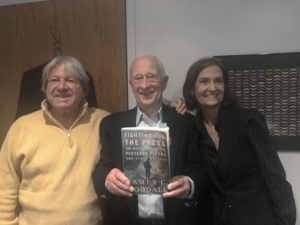

Attorney James Goodale On Julian Assange Arrest
Last week, at the behest of the U.S. government, police entered the Ecuadorian Embassy and arrested Julian Assange on charges of espionage. This case promises to threaten the First Amendment rights of all journalists. We’re honored to have one of the nation’s foremost authorities on First Amendment law, Attorney James Goodale. In the April edition of the Atlantic, he wrote an article titled, Why Julian Assange deserves First Amendment Protection.
Listeners may recall that last fall, a court filing inadvertently suggested that the Justice Department had indicted WikiLeaks founder Julian Assange. The Wall Street Journal, the New York Times, and other outlets reported soon after that Assange had likely been secretly indicted for conspiring with his sources to publish classified government material and hacked documents belonging to the Democratic National Committee, among other things.
Assange started WikiLeaks in 2006 to provide a place for newsworthy information to be confidentially released. The site came gained prominence when Assange obtained thousands of classified documents relating to the Iraq War from US Army soldier Chelsea (born Bradley) Manning.
Guest – Attorney James C. Goodale has represented The New York Times in four of its cases to go to the Supreme Court: the Pentagon Papers case (The New York Times Co. v. The U.S.), The New York Times Co. v. Sullivan (libel), Branzburg v. Hayes (see below) and The New York Times Co. v. Tasini, (digital rights). He developed the argument that the Espionage Act does not apply to publishers or the press.
In a 6-3 decision, the Supreme Court ruled the U.S. Government could not stop the Times from publishing the Pentagon Papers, holding that prior restraints were barred by the First Amendment unless the publication “will surely result in direct, immediate, and irreparable damage to our Nation or its people.” He became known as the “father of the reporter’s privilege.” A prolific writer, he has written two books on the First Amendment, The New York Times v. The U.S. and All About Cable, and approximately 200 articles, particularly on the role of the press in the Information Revolution.
—-


Al Otro Lado and the Border Crisis
United States President Donald Trump said that we have a “crisis” on the border. He called it an “infestation” and said that “These aren’t people. These are animals.” Last week he fired Kirstjen Nielsen who as the head of the Department for Homeland Security pursued the most aggressive enforcement strategy of any secretary in the history of the organization. Nielsen and the Trump administration has separated children from their parents and instituted an illegal turn back policy using tactics to restrict the numbers of asylum-seekers who want to access the asylum process at points of entry like Tijuana and El Paso.
Tactics used by the administration include lies, intimidating coercion, verbal abuse, physical force, out right denial of access, unreasonable delay, threats, and family separation. The Center for Constitution Rights is currently representing Al Otro Lado, a legal and human rights organization that helps migrants at the border. They are challenging the U S. Customs and Border Patrol on its turnaround policy in a pending lawsuit.
Last month CCR’s chairwoman of the board and Columbia Law Professor Katherine Franke met six students in Tijuana Mexico, across the border from San Diego, California, to advise migrants on what they will face in the hands of US legal authorities.
- Al Otro Lado provides essential legal support to migrants to prepare them for the asylum process in the U.S. You can support here.
- Santa Fe Dreamers also provides free legal support to immigrants, with a particular focus on transgender immigrants.
- Please visit this site if you are interested in contributing to the parole/bail fund for detainees.
- If you are interested in serving as a sponsor for an asylum seeker.
- This video offers a very good portrait of the situation at Chaparral where La Lista is maintained and asylum seekers wait for their number to be called.
Guest – Attorney Katherine Franke, is the Sulzbacher Professor of Law, Gender, and Sexuality Studies at Columbia University, where she also directs the Center for Gender and Sexuality Law and is the faculty director of the Law, Rights, and Religion Project (Formerly the Public Rights/Private Conscience Project). She is a member of the Executive Committee for the Institute for Research on Women, Gender and Sexuality, and the Center for Palestine Studies. She is among the nation’s leading scholars writing on law, religion and rights, drawing from feminist, queer, and critical race theory.
——————

——————
Civil Liberties, Crony Capitalism, Human Rights, Political Prisoner, Prison Industry, Truth to Power
Podcast: Play in new window | Download
Updates:
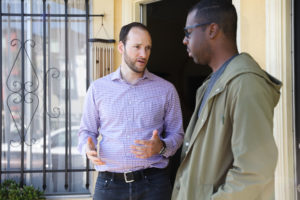

Attorney Chesa Boudin: Prison and Cash Bail Reform
Recently we have seen people who are progressives run for the office of prosecutor in cities across the country. This is an office which many people associate with police departments with whom they closely work. The new crop of reform minded prosecutors are saying that the criminal justice system is broken, that it is costly, classist, and racist. They say it is ineffective in keeping people safe and that 2/3 of the people convicted wind up back in prison in a few years.
Guest – Attorney Chesa Boudin who is currently an Assistant Public Defender in San Francisco. He is running for the office of district attorney in that city. The ideas for reform in the criminal justice system that he has put forward in his campaign are receiving wide attention and considerable support. Boudin was instrumental in getting the discriminatory practice of cash bail eliminated in San Francisco.
—-

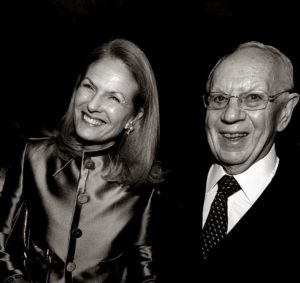
OxyContin Epidemic And the Sackler Family
In March, the maker of OxyContin and the family that owns the company, reached a $270 million settlement with the state of Oklahoma over the painkiller’s role in the nation’s opioid crisis. Purdue Pharma is based in Stamford, CT and is controlled by the Sackler Family.
The money will go toward creating a National Center for Addiction Studies and Treatment at Oklahoma State University in Tulsa. The deal comes two months before Oklahoma’s lawsuit against Purdue and other pharmaceuticals blamed for the crisis was set to go to trial.
Purdue Pharma introduced OxyContin more than two decades ago, marketing the highly addictive drug aggressively to physicians. It has made billions of dollars from the drug but faces approximately 2,000 lawsuits from state and local governments trying to hold the company responsible for deadly epidemic.
The Centers for Disease Control reports the prescription opioids like OxyContin were a factor in a record 48,000 deaths across the U.S. in 2017.
Purdue Pharma has settled other lawsuits over the years, and three executives pleaded guilty to criminal charges in 2007. But this is the first settlement to come out of the current coast-to-coast wave of litigation that focuses on the company’s more recent conduct and threatens to drive it to bankruptcy.
Guest – Liz Whyte, an award-winning reporter for the investigation news organization the Center for Public Integrity. Politics of Pain Report. She is a reporter for the Consider the Source state politics team, where her investigative work has won awards from the National Press Club, Editor & Publisher, the Association of Health Care Journalists, the New York Press Club and local chapters of the Society of Professional Journalists.
—————————-

—————————-














